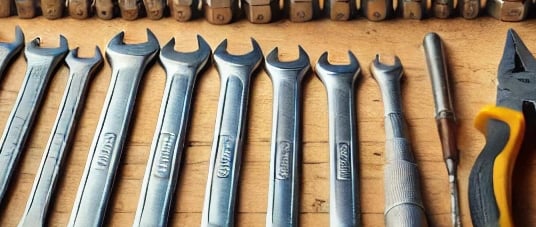Safety Precautions in Small Engine Repair: Oakland, MD Guide
Safety Precautions in Small Engine Repair: Oakland, MD Guide
8/4/20242 min read


Working on small engines can be highly rewarding, but it's essential to prioritize safety. This guide covers essential safety precautions to follow while repairing small engines, ensuring you stay protected while getting the job done efficiently.
Essential Safety Gear for Small Engine Repair
Overview: Wearing the proper safety gear can prevent injuries and ensure a safer working environment.
Safety Glasses: Protect your eyes from flying debris and harmful fluids.
Gloves: Prevent cuts and burns while handling sharp or hot components.
Ear Protection: Shield your ears from loud engine noises.
Steel-toed Boots: Protect your feet from heavy falling objects.
Long Sleeves and Pants: Reduce the risk of cuts, scrapes, and chemical exposure.
Working in a Safe Environment
Overview: Creating a safe workspace is crucial for effective and accident-free engine repairs.
Ventilation: Always work in a well-ventilated area to avoid inhaling fumes.
Clean Workspace: Keep your work area organized and free of clutter.
Proper Lighting: Ensure the workspace is well-lit to avoid mistakes and accidents.
Fire Safety: Have a fire extinguisher nearby and know how to use it.
Pre-Repair Safety Checks
Overview: Conducting safety checks before starting any repair can prevent accidents and equipment damage.
Disconnect the Spark Plug: Prevent accidental engine starts.
Drain Fuel: Remove fuel to prevent spills and potential fires.
Check for Leaks: Ensure there are no fuel or oil leaks before starting repairs.
Secure the Engine: Use clamps or a vice to keep the engine stable during repairs.
Handling Hazardous Materials
Overview: Small engine repairs often involve hazardous materials. Handle them with care to avoid health risks.
Read Material Safety Data Sheets (MSDS): Understand the properties and risks of chemicals you’re using.
Proper Storage: Store chemicals in labeled, sealed containers away from heat sources.
Disposal: Dispose of hazardous materials according to local regulations.
Safe Use of Tools and Equipment
Overview: Using tools correctly and safely is crucial to avoid accidents during repairs.
Inspect Tools: Check tools for damage before use.
Use the Right Tool for the Job: Avoid makeshift tools which can cause accidents.
Follow Manufacturer Instructions: Adhere to guidelines for operating power tools and equipment.
Unplug Tools When Not in Use: Prevent accidental starts and electrical hazards.
Emergency Preparedness
Overview: Being prepared for emergencies can significantly reduce the impact of accidents.
First Aid Kit: Keep a stocked first aid kit readily available.
Emergency Contacts: Have emergency contact numbers and a phone nearby.
Know CPR: Basic knowledge of CPR can be life-saving.
Fire Safety Plan: Have an evacuation plan in case of fire.
Specific Precautions for Oakland, MD Residents
Overview: Residents of Oakland, MD should be aware of specific local regulations and conditions that may affect safety.
Local Regulations: Familiarize yourself with Oakland’s safety and disposal regulations for hazardous materials.
Weather Conditions: Be mindful of the seasonal weather, especially in winter, which may require additional precautions for working in cold conditions.
Conclusion
Prioritizing safety in small engine repair ensures not only your well-being but also the longevity and performance of your engines. By following these safety precautions, you can tackle repairs with confidence and peace of mind.
Keywords: Oakland MD small engine repair, safety precautions, small engine repair safety gear, safe workspace for engine repair, handling hazardous materials in engine repair.
